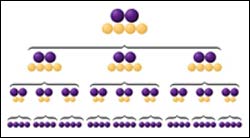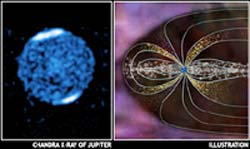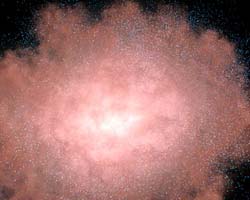This area deals with the fundamental laws and building blocks of nature and how they interact, the properties and the behavior of matter, and research into space and time and their structures.
innovations-report provides in-depth reports and articles on subjects such as astrophysics, laser technologies, nuclear, quantum, particle and solid-state physics, nanotechnologies, planetary research and findings (Mars, Venus) and developments related to the Hubble Telescope.

Preparations for the arrival of “Jules Verne”, the first European Automated Transfer Vehicle (ATV), and those for ESA astronaut Roberto Vittori’s mission, took a step forward when the unmanned Russian cargo spacecraft Progress M-52 docked yesterday, 2 March at 21.10 Central European Time (CET) with the International Space Station (ISS).
Launched two days earlier, on 28 February at 20.09 CET from the Baikonur Cosmodrome in Kazakhstan by a Soyuz rocket as ISS mission 17P, the Progre

A full-scale quantum computer could produce reliable results even if its components performed no better than today’s best first-generation prototypes, according to a paper in the March 3 issue in the journal Nature* by a scientist at the Commerce Department’s National Institute of Standards and Technology (NIST).
In theory, such a quantum computer could be used to break commonly used encryption codes, to improve optimization of complex systems such as airline schedules, and to s

Discovery points to new class of astronomical objects
Astronomers at Sweet Briar College and the Naval Research Laboratory (NRL) have detected a powerful new bursting radio source whose unique properties suggest the discovery of a new class of astronomical objects. The researchers have monitored the center of the Milky Way Galaxy for several years and reveal their findings in the March 3, 2005 edition of the journal, “Nature.”
Principal investigator, Dr. Scott Hyman, pr

Scientists have obtained new insight into the unique power source for many of Jupiter’s auroras, the most spectacular and active auroras in the Solar System. Extended monitoring of the giant planet with NASA’s Chandra X-ray Observatory detected the presence of highly charged particles crashing into the atmosphere above its poles.
X-ray spectra measured by Chandra showed that the auroral activity was produced by ions of oxygen and other elements that were stripped of most

It is the hugest superconducting solenoid in the world and it is able to generate a magnetic field 100.000 times stronger than the Earth’s one
The hugest superconducting solenoid ever built in the world is finally completed. It is formed by five huge modules connected each other and will generate a magnetic field of 4 Tesla, equal to 100.000 times the Earth magnetic field. This extraordinary system will be dedicated to Cms (Compact Muon Solenoid) experiment at Lhc accelerator at

Cornell University-led team operating the Infrared Spectrograph (IRS), the largest of the three main instruments on NASA’s Spitzer Space Telescope, has discovered a mysterious population of distant and enormously powerful galaxies radiating in the infrared spectrum with many hundreds of times more power than our Milky Way galaxy. Their distance from Earth is about 11 billion light years, or 80 percent of the way back to the Big Bang.
Virtually everything about this new clas